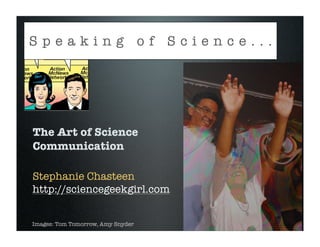
Speaking of Science... the art of science communication
- 1. Speaking of Science... The Art of Science Communication Stephanie Chasteen http://sciencegeekgirl.com Images: Tom Tomorrow, Amy Snyder
- 2. Audio: David Kestenbaum & Marvin Marshak: Neutrinos
- 3. My points for today Communication is necessary in today’s careers We can’t treat our audience like they’re stupid (but we can’t treat them like they’re scientists either) The data do not speak for themselves.
- 4. My career path • I’m a generalist • Social psychology and physics • Science journalism and education my blog has a recent post about my non-linear career path http://blog.sciencegeekgirl.com
- 5. We need to communicate with many audiences • Our students • Other academics (across disciplines) • The public • The media Image from: shirray-langley.abbozzogallery.com/
- 6. Image by Tomasz Sienicki the media is powerful
- 7. Changing view of science communication scientific literacy (1960-1980’s) let’s educate that ignorant public media & public scientists
- 8. the deficit model science “The deficit model assumes that the public are empty vessels waiting to be filled with useful information upon which they will rationally act.” Nerlich, Koteyko, and Brown, “Theory and language of climate change communication,” Wiley Interdisciplinary reviews, 1, 2010.
- 9. The current model science & society (present) we have the attitude problem... we need to know more about our audience media & public scientists image victorvoigt
- 10. How do you get your message across? What are some techniques that have worked for you when... ★ Talking to the public? ★ Teaching your students?
- 11. 3 keep it know your key simple audience points metaphors, make it Communication analogy, relevant tips examples build no tell a from jargon story familiar
- 12. These should seem familiar to you as educators... People have prior knowledge & beliefs Scaffold understanding Motivation is important to learning Don’t exceed cognitive load Make it relevant / connect to everyday life Respect learners
- 14. Don’t be so cerebral “arouse and fulfill”
- 15. find the story Audio: David Kestenbaum & Tony Leggett: Superconductivity Audio: Christopher Joyce and William Eberhard, A Spider’s Web Image: Luc Viatour, www.lucnix.be
- 16. find the story Audio: David Kestenbaum & Tony Leggett: Superconductivity Audio: Christopher Joyce and William Eberhard, A Spider’s Web Image: Luc Viatour, www.lucnix.be
- 17. How do you tell your story? mo del scie ntist background supporting details (data) results & conclusions “the facts speak for themselves”
- 18. the deficit model does not work!
- 19. st m odel journali bottom line key details (data) back- ground What’s your No more than elevator 3 main points. speech?
- 20. What’s your bottom line? Consider these ideas: • The facts don’t speak for themselves • Tell a story (narrative structure) • Journalists’ inverted pyramid How might these apply to you? In communication? In classes?
- 21. How do these ideas apply to academic work? • Papers? • Talks?
- 22. There’s more to life than accuracy “The reason you can't walk through a wall is that your atoms and the atoms in the wall interact with each other. They speak the same language”* * it’s more complicated than that understandability accuracy & interest
- 23. perception
- 25. expert knowledge what makes experts smart? Expert knowledge is organized around big ideas. Most people don’t have that framework. So start with the familiar, and build a map.
- 26. ground the explanation in the familiar start here... and build up to... the tough stuff. walls & people... atoms & electric charge neutrinos and of course, avoid jargon
- 27. why should people care? Audio: David Kestenbaum & John Morgan: Poincare Conjecture Image: http://www.scottberkun.com/essays/essay29.htm
- 28. there is a time for telling but not too soon! arouse... and then fulfill! image from http://www.seniorsworldchronicle.com/2009/08/usa-professors-john-baldwin-68-and.html
- 29. So, it is important to communicate well. But we don’t just need to repeat our message louder 1. We need to decide what our messages are. 2. We need to make our messages accessible. 3. We need to motivate... THEN educate 4. This is important - and possible - for all levels of science (and in our classes!)
- 30. More resources http://www.dontbesuchascientist.com/ http://www.ucsusa.org/publications/ scientist-media-guide.html http://communicatingscience.aaas.org/
- 31. Shameless Plug Learning About Teaching Physics. AAPT funded audio podcast communicating physics education research (PER) to teachers. (Coming soon = “Creating a Time for Telling”) http://perusersguide.org/podcasts
- 32. Thank you! Notes and presentation will be posted at http://blog.sciencegeekgirl.com Podcast @ http://perusersguide.org/podcasts How does this work? Maybe some scientist can tell us, using simple language and familiar metaphors? Yeah, by telling us a concise interesting and entertaining story full of substance!
